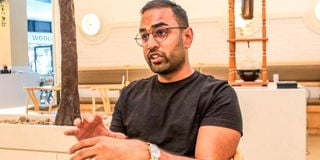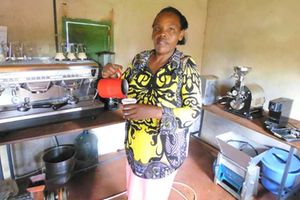
Founder of Barista and Co Specialty Coffee Roasters Chirag Shah during an interview on September 9, 2024, at Sarit Centre in Nairobi.
Right from his days at Les Roches International Hospitality School in Switzerland and subsequent employment at major hotel chains, starting from the bottom, Chirag Shah knew that his destiny was in entrepreneurship in the hospitality industry, specifically a restaurant and specialty coffee shop.
“I built myself up in the industry for five years then launched Barista and Co Specialty Coffee Roasters, whose original idea was to roast and sell Kenyan coffee and roasted coffee beans to other restaurants and hotels,” Chirag says.
Immediately after the launch, Chirag quickly learnt that customers wanted to spend more time dining in at his cafés, so he decided to expand the menu to include bakery, sandwiches, desserts, pastries, etc., inspired by an all-day Mediterranean brunch.
“I had a masterplan to gain hands-on experience, which would be critical in running a business because hospitality is about serving customers and you need to understand the product very well,” he says.
Chirag admits that despite having a fantastic business plan, circumstances change and for him, the Covid-19 pandemic threw him off balance. And since customers prefer to drink coffee hot and it cannot be sold via delivery, this scenario forced him to think outside the box and create alternative revenue streams, marking the genesis of further expansion of the menu to include pizzas and cakes, among other products.
The coffee supply chain
Chirag says that in Kenya where the company sources its green coffee, the supply chain is set up in a way that farmers deliver their coffee to a factory for washing, pulping and sun drying, and then the coffee beans are taken to a miller who passes them on to a marketer. The marketer delivers them to the auction where dealers buy the coffee, even though this has changed to allow farmers to sell directly to the market.
“We roast our coffee within our facility and it is a scientific process – roasted at the right temperature and time to achieve the desired flavours,” he explains.
The biggest challenge in the coffee supply chain is that prices fluctuate due to climatic factors and world demand, causing shortages that ultimately affect the price of coffee at the table, the businessman says.
Picking the right location and warding off competition
Chirag says that for his kind of venture, an entrepreneur needs to have a target audience based on the product, price point and business concept you have in mind. Ideally, one needs to pick a location with a high population density of their target audience, which could be malls or residential areas of people who appreciate your products and concepts.
“Our focus is on quality, customer experience and product points. We source the best coffee and ingredients for our bakery plus [we have] quite an intense hiring process and in-house training to get high-quality personnel,” he adds.
With this approach, Barista & Co Specialty Roasted Coffee has grown to three branches at Sarit Centre, Westgate Mall and Riverside Drive with 160 employees, and is in the process of opening more outlets in Nairobi’s upmarket neighbourhoods.
Cost points and navigating Covid-19
The hospitality industry guru says that at Barista and Co Specialty Roasted Coffee, their biggest concern is managing the cost of ingredients – hyperinflation has been causing prices to rise monthly or quarterly.
“We experience price reviews every month so managing that is a challenge. Coffee is traded in US dollars so forex fluctuations have been a challenge too,” explains Chirag, adding that labour costs are going up due to the many levies introduced by the government.
Chirag says that the Covid-19 pandemic was a very stressful and difficult period and the first plan was how to better manage the cash flow, landlords, staff and suppliers, which required innovation and observing global trends and trying to implement them.
“We used incentives to encourage customers to buy coffee beans and make coffee at home, learn coffee brewing techniques through videos and social media, and that’s how we coped from a revenue standpoint,” he recalls.
Taking advantage of emerging industry trends
Chirag says coffee processing is evolving, with new trends and different coffee processing techniques emerging.
“We have the carbonic maceration, which is a wine-making technique employed in coffee processing. It delivers phenomenal results and gives different flavours,” Chirag says.
He adds that coffee brewing techniques have changed from traditional espresso-based techniques like cappuccinos, lattes, etc. to hand brewers that deliver beautiful results
Taking advantage of emerging industry trends
Chirag says coffee processing is evolving, with new trends and different coffee processing techniques emerging.
“We have the carbonic maceration, which is a wine-making technique employed in coffee processing. It delivers phenomenal results and gives different flavours,” Chirag says.
He adds that coffee brewing techniques have changed from traditional espresso-based techniques like cappuccinos, lattes, etc. to hand brewers that deliver beautiful results.
Capex and managing cashflow
The capital outlay for setting up a coffee outlet depends on the concept, size and design of the outlet, as well as the product and equipment required.
“We live in a global world with access to internet and one is able to research trending concepts on social media easily and see what’s happening around from concepts to recipes.”
Chirag believes that managing cash inflow is the biggest problem for any business and the first thing is to figure out what brings in the revenue which then boils down to products, services and customer experience, so one has to first work on that. It takes a few years to build that, and once you do that and you have a loyal customer base, you solve the revenue problem.
“Thereafter, you grow revenue through innovations and designing new product offerings, looking for new additional sources of revenue through delivery platforms, catering services, B2Bs, evaluating your internal programmes on areas of improvement, which could be service delivery experience that affects revenue,” he says.
Chirag advises that if the products are not bringing in the desired revenue, then make changes. Change is a continuous process.
For those looking to raise capital to start a business, a good business plan with detailed financial planning for 5 to 10 years is something that financial institutions would be willing to support, he says.
Mistakes and business succession
Chirag believes that making mistakes and learning from them is part of running a business and as an entrepreneur, you learn from the mistakes. No decision is perfect and things don’t always go according to plan, and it’s really important to be open to new ideas.
For a family business like his, the entrepreneur says success starts with free, fair and open communication with family members, but beyond that, having a good organisational structure in place where roles and responsibilities are clearly outlined and identified.
“Communication needs to start from a very young age with family members and success of any family business requires proper planning and foresight of what the future will look like, and having clear plans in advance for conflict resolutions,” he advises.








